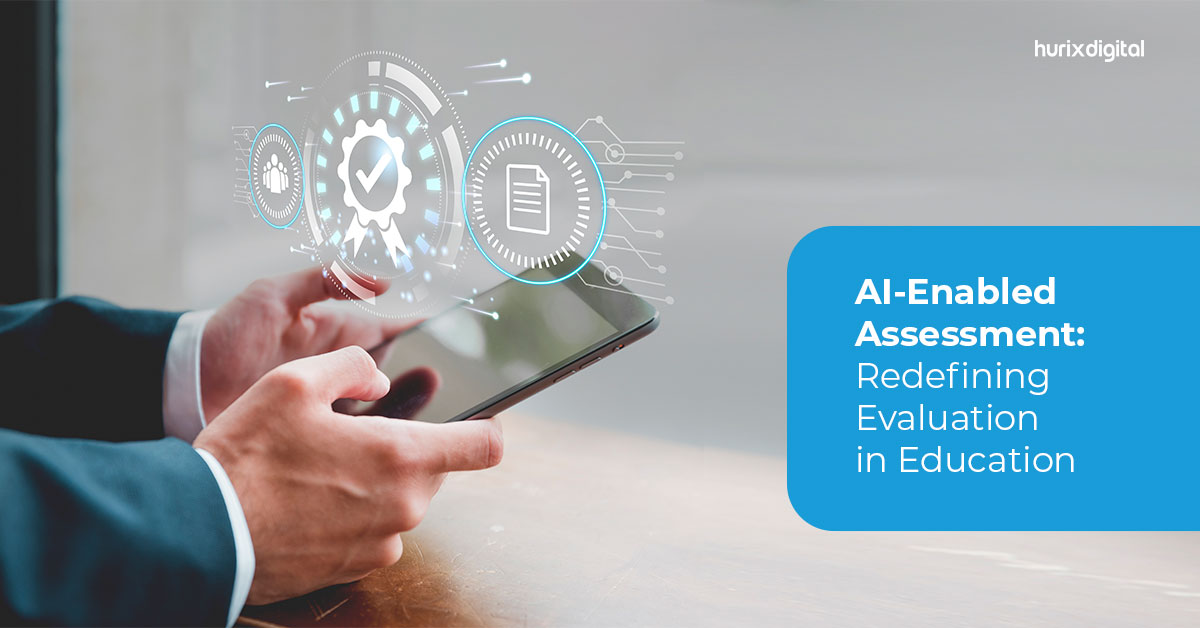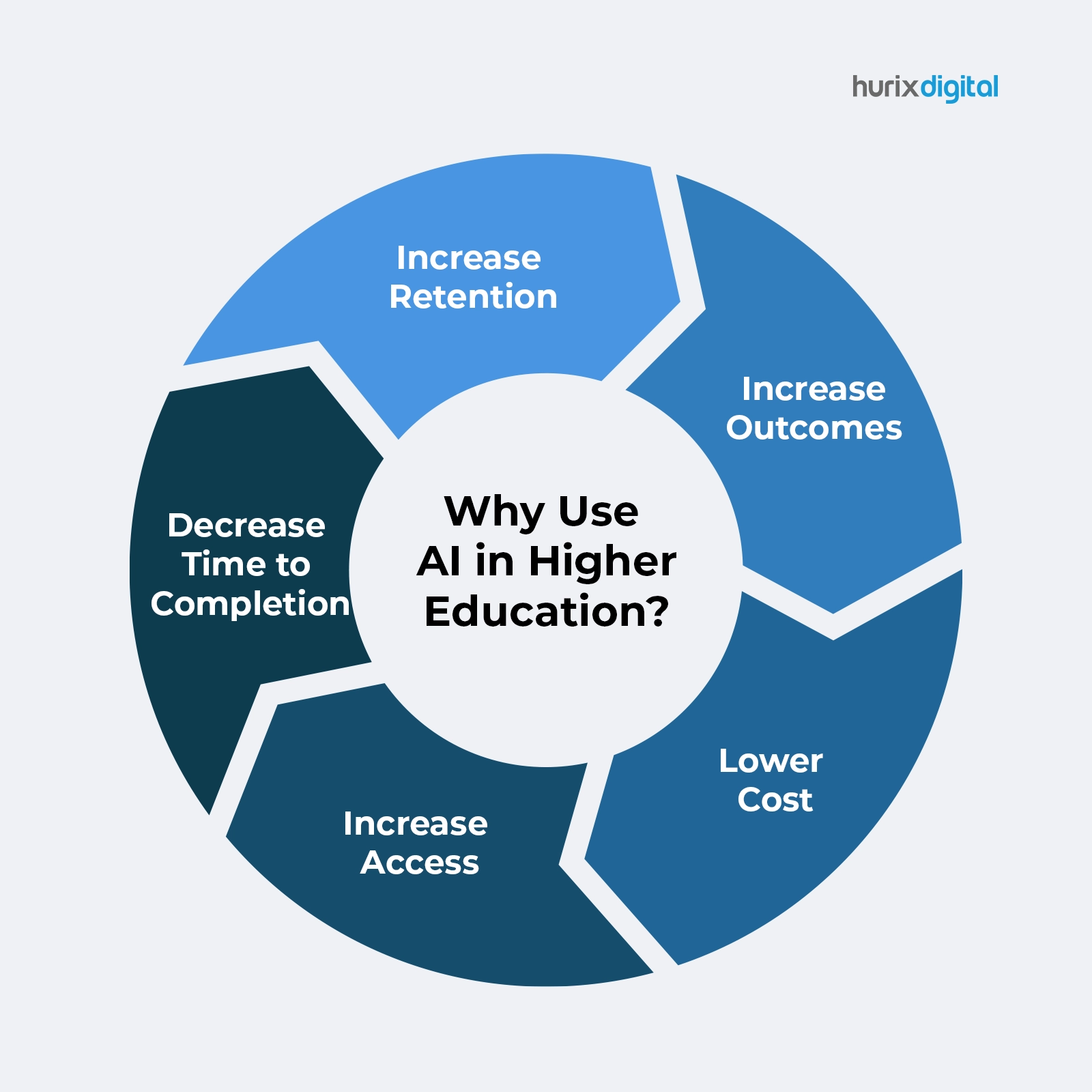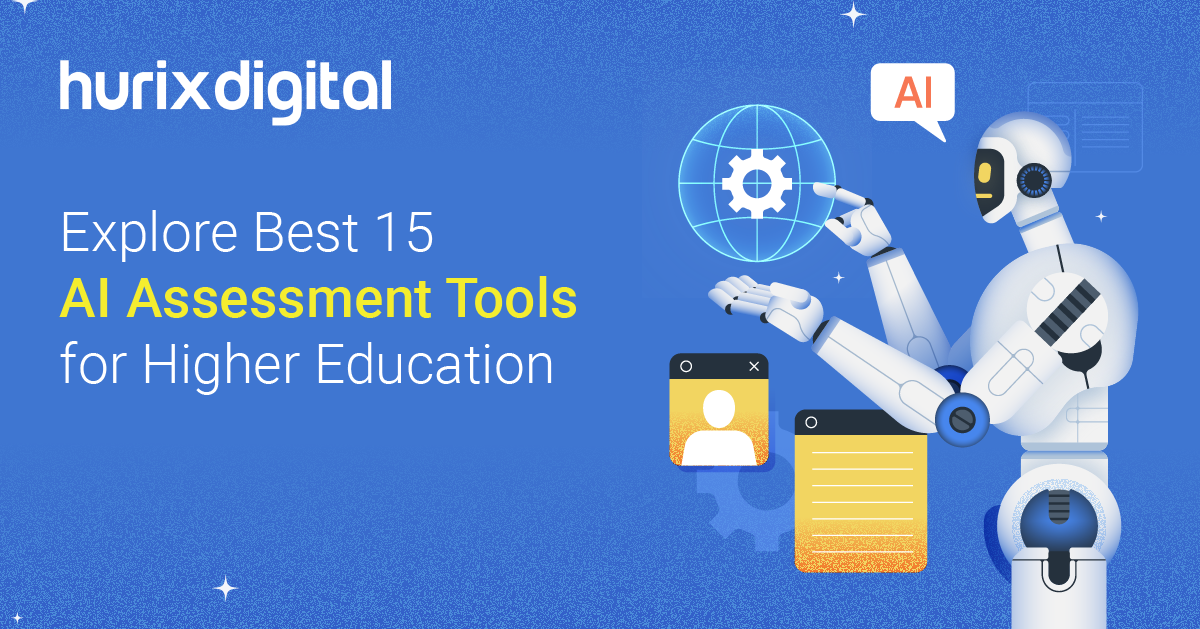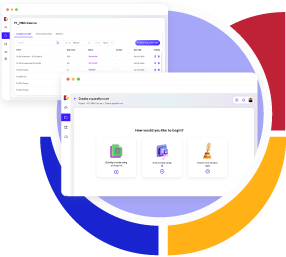
AI-Enabled Assessment: Redefining Evaluation in Education
Artificial Intelligence (AI) is transforming every facet of life, and education is no exception. As of 2025, it’s projected that over 55% of learning management systems (LMS) will be integrated with AI capabilities. Educators, trainers, and instructional designers are increasingly relying on AI to deliver personalized, data-driven learning experiences that adapt to individual learner needs and improve outcomes.
AI integration in higher education is revolutionizing learning delivery, ensuring greater efficiency, personalization, and scalability. One of the most impactful applications of this transformation is AI-enabled assessment—an innovative approach that uses artificial intelligence to automate, enhance, and personalize the evaluation process. From adaptive quizzes to intelligent feedback systems, AI-enabled assessment empowers educators to evaluate learner progress with improved accuracy and objectivity.
This blog examines how AI assessment tools bring more efficiency, creativity, and engagement to our learning.
Table of Contents:
- What is AI-Enabled Assessment?
- What is AI in Higher Education?
- Traditional vs AI-Enabled Assessment
- What are the Advantages of AI-Enabled Assessment?
- Final Thoughts
What is AI-Enabled Assessment?
AI-enabled assessment refers to the use of artificial intelligence technologies to automate, personalize, and enhance the evaluation process in education. It enables real-time feedback, adaptive testing, data-driven insights, and scalable assessment solutions to improve learning outcomes and instructional strategies.
What is AI in Higher Education?

AI has been demonstrated to be one of the most effective technologies, adding value across several sectors. AI in higher education enables computer systems to simulate learning design and streamline evaluation processes that previously required human intelligence.
However, the usage of AI in education is not a new phenomenon. In 1960, it was introduced by the University of Illinois through Programmed Logic for Automatic Teaching Operations (PLATO). This computerized instruction-based learning system offered coursework to a wide range of learners, including students from local schools to prison inmates.
Today, the usage of AI in learning enables educators to scale their learning initiatives, benefit from data-driven design and delivery, personalize learning paths, and offer accessible programs to a spectrum of learners. Using AI assessment in education also brings several advantages to the evaluation culture and workflow.
Also Read: Transforming Education with AI: Innovations in Curriculum Design
Traditional vs AI-Enabled Assessment
| Feature | Traditional Assessment | AI-Enabled Assessment |
|---|---|---|
| Feedback | Delayed | Instant and personalized |
| Grading | Manual | Automated |
| Adaptability | One-size-fits-all | Adaptive to learner |
| Data Usage | Limited | Data-driven insights |
What are the Advantages of AI-Enabled Assessment?
Here is a snapshot of how AI-based assessment helps enhance the testing and evaluation process for learners:
1. Personalization of assessments
The traditional testing route followed a one-size-fits-all model. However, most learners – employees or students- have different proficiency levels. AI-based assessment enables the personalization of quizzes and tests based on a learner’s skills, knowledge, and capabilities. Such an approach increases motivation levels because assessments are never too easy or difficult for students to complete.
2. Automation of assessment processes
Human intervention in designing, delivering, and evaluating assessments is limited in an AI assessment framework. Traditionally, these have been extremely resource-driven, cumbersome processes. But with technological advances, AI-driven tools can curate assessments, evaluate performance, tally scores, and deliver results. Educators can channel their efforts towards more high-value needs.
3. Wide range of assessments
The spectrum of assessment spans a wide range – from language testing and mathematics to coding. AI in educational assessment can deliver a wide range of testing methods. For instance, AI can be applied to a live simulation format that tests job skills.
AI brings innovation to the assessment process, making it more engaging for learners. Moreover, with generative AI, teachers can easily develop various types of questions based on the subject matter, even when conducting offline tests.
4. Use of Natural Language Processing
Use of AI in assessment can enhance learning through its Natural Language Processing (NLP) capabilities. For language learning, NLP enables superior speech recognition, which can be leveraged during oral assessments to test a learner’s grammar, syntax, and pronunciation of words.
NLP can also enhance writing skills by evaluating students’ essays and providing comprehensive feedback on grammar, structure, tone, and other elements.
Teachers can use NLP analysis to match reading materials to students based on their abilities, ensuring appropriate challenge and engagement. This will help teachers identify areas of improvement and provide fair assessments to all students.
Also Read: How Can Teachers Leverage AI in K12 Education?
5. Deliver instant feedback
One of the top benefits of AI-enabled education is that learners can access instant feedback. Learners can view errors, correct responses, and receive an evaluation in real time.
This approach enables better retention. Moreover, further assessments can be personalized based on the learners’ performance in the previous one. Feedback can also be given in multiple ways – audio, visual, and text highlights – thus making it accessible to all learners.
6. Gamification of assessments
The usage of AI in educational assessment has spearheaded an interesting trend. AI in education and assessments, in particular, can be integrated with gamification to enhance the learning journey further. How does it work?
These two technologies work well in conjunction with each other. For instance, introducing challenges, rewards, and recognition tools like leaderboards, make the AI assessment framework a much more engaging and challenging process for learners.
AI plays an important role in this journey as every new assessment is based on the learner’s last performance, with lots of scope for revision. This approach makes learning engaging and challenging and expedites learning speed.
7. Enhanced quality of assessment data
Another key benefit of using AI in assessment is that companies and education providers get access to massive amounts of advanced data analytics. Educators can leverage advanced data insights to understand learning and skill gaps and improve the quality of learning resources and assessment content.
AI can also predict future learner behavior through pattern recognition of a learner’s past behavior and habits.
8. Boost the frequency of assessments
The resource-intensiveness of traditional assessment methods made it difficult to host assessments frequently. However, the introduction of AI in assessment has made it easy for education service providers to increase testing frequency. This is an important value addition, as learning platforms can track learning effectiveness at every step.
Final Thoughts
The AI in education market size is predicted to reach $30 billion by 2032, transforming elementary, high school, and university education and beyond.
Learning service providers that leverage AI in assessments and the entire learning flow will be able to offer increased demographic reach and scale their learning interventions.
If you want to transform your learning initiatives with the smart use of AI, Machine Learning, and automation, Hurix Digital will support you in meeting all your needs.
Get in touch with us to start a conversation.
Frequently Asked Questions (FAQs)
Q1: Can AI auto-grade open responses?
A1: Yes—AI-assisted scoring evaluates text answers for relevance, coherence, and concept correctness.
Q2: How does AI ensure fairness?
A2: Through bias audits, transparent algorithms, and standardized machine-training controls.
Q3: Can AI detect plagiarism?
A3: Yes—AI tools compare writing patterns and external sources to flag possible plagiarism.
Q4: What assessments benefit most from AI?
A4: Essays, code, spoken responses, and large-volume testing scenarios gain most from AI tools.
Q5: Is AI engaging for students?
A5: Instant feedback and adaptive paths boost student clarity, self-awareness, and confidence.

Senior Vice President – Business Development
at Hurix Digital, with over 25 years of experience in EdTech and workforce learning. He excels in business development, customer relationship management, and scaling digital learning solutions, driving global growth through innovative content, simulations, and AI‑driven training offerings
 We’re live! Explore the all-new
We’re live! Explore the all-new 



